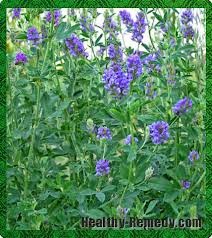ALFALFA: Medicago Sativa
Also known as: Lucerne, Buffalo Herb
Parts Used: aerial portions
Meridians/Organs affected: stomach, blood, structural, circulatory, liver
Properties: nutritive tonic, restorative, antipyretic, alterative, anti-anemic, anti-hemorrhagic, diuretic, bitter, stomachic
This sweet scented, tap rooted perennial is actually a member of the Leguminosae (Pea) family. It has leaves that are divided into 3 oblong shaped leaflets that are jaggedly toothed on the upper portion. The flowers are a purple color, sometimes a bluish purple and on rare occasions it can be white and it will bloom throughout the summer months. It can get up to 2-3 feet tall and is native to Eurasia but can be found all over the Mediterranean, North America and western Asia today.
Alfalfa dates back to 2000 BC to ancient Armenia, where it was cultivated for man and beast alike. It has been called the 'King of Herbs' but in fact the origin of alfalfa goes back to the Iranian term 'aspasti' which roughly translated means 'horse fodder'. It was introduced to the Greeks around 490 BC and from there it spread across Europe and parts of Africa. The Spanish are responsible for bringing it to North America and the gold miners carried it across the united states. There are currently around 80 million acres dedicated to its growth with 27 million of those here in the usa. The bulk of this is used for livestock. Bees love it as it produces a high quality nectar for them. Other uses of alfalfa are as a commercial source of carotene and chlorophyll. It is consumed in the form of sprouts by many and it has been added to sandwiches and salads as a green.
Alfalfa is a very nutritive herb containing 8 essential amino acids, calcium, iron, phosphorus, potassium, magnesium, vitamins A, B, C, D, E, K, U, P and is about 18-19% protein. It has been used by herbalists across the globe for inflammatory conditions, especially rheumatism and arthritis. It has also been used as a blood purification plant. Dioscorides wrote of it in 'De Materia Medica' as an herb for digestion and bleeding. Gerard also recommended it for stomach upset. It has been used for convalescents, celiac disease, internal bleeding, pregnancy, to stimulate one's appetite and promote weight gain, as a diuretic, for diabetes and cancer and a host of other issues. The question here is about what it has been proven effective for as opposed to what is just anecdotal according to modern science. (And we all know THEY are always right huh...)
Alfalfa contains a number of phytochemicals that have been found to neutralize various types of cancer. Due to its nutrient content it also is useful in maintaining a healthy liver and supporting the body's own resistance in times of anemia or heavy medicating. Alfalfa has also been found to contain some 'insulin sparing' components making things easier on the pancrea thus aiding in diabetic type conditions. It has been found to contain elements that increase smooth muscle tone in the digestive tract thus decreasing the amount of gastric secretions making it helpful or colon disorders and stomach complaints. It is high in anti-inflammatory agents which explains its usefulness for arthritis and there is no dispute over its ability to detoxify the blood. It is a cousin to astralagus which is highly regarded by the Chinese as an immune enhancing herb. Recent studies have shown alfalfa to be effective against some fungi and in experiments on monkeys it has been found to reduce arterial plaquing and cholesterol levels. Alfalfa contains the enzyme betaine which helps one's digestive processes.
However you choose to look at it alfalfa is a wonderful herb with many healing properties. It has been used for cystitis, prostatitis, peptic ulcers, backaches, to increase the flow of milk in nursing mothers, to regulate the bowels and of course for arthritis and rheumatism. Alfalfa taken long term (a period of years) has been found to aggravate some auto-immune conditions such as lupus as it makes one more sensitive to sunlight. As it also has a fair amount of saponin it can cause bloating and blood clotting when consumed in large amounts.
http://www.amazon.com/Jensen-10712-Alfalfa-1000-Tabs/dp/B0011DJ4RK/ref=sr_1_6?ie=UTF8&qid=1421020116&sr=8-6&keywords=alfalfa
http://www.amazon.com/Natures-Way-Alfalfa-Leaves-Capsules/dp/B00014DUNO/ref=sr_1_7?ie=UTF8&qid=1421020116&sr=8-7&keywords=alfalfa
http://www.amazon.com/Starwest-Botanicals-Organic-Alfalfa-1-pound/dp/B003AYEHEI/ref=sr_1_9?ie=UTF8&qid=1421020116&sr=8-9&keywords=alfalfa
http://www.amazon.com/Now-Foods-Organic-Alfalfa-12-Ounce/dp/B004G2M6CI/ref=sr_1_10?ie=UTF8&qid=1421020116&sr=8-10&keywords=alfalfa
http://www.amazon.com/Now-Foods-733739026149-ALFALFA-POWDER--1-LB/dp/B000W78L3E/ref=sr_1_11?ie=UTF8&qid=1421020116&sr=8-11&keywords=alfalfa
http://www.amazon.com/Alfalfa-Sprouting-Seeds-Chemical-Germination/dp/B00CLVT3XQ/ref=sr_1_12?ie=UTF8&qid=1421020116&sr=8-12&keywords=alfalfa
http://www.amazon.com/Natures-Answer-Alcohol-Free-Alfalfa-1-Fluid/dp/B00014HOKE/ref=sr_1_16?ie=UTF8&qid=1421020116&sr=8-16&keywords=alfalfa
http://www.amazon.com/Shaklee-Alfalfa-Complex-700-Count/dp/B008E6GAJ2/ref=sr_1_15?ie=UTF8&qid=1421020116&sr=8-15&keywords=alfalfa





No comments:
Post a Comment